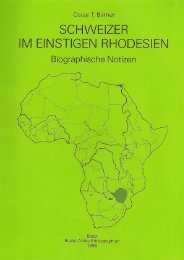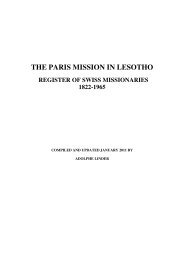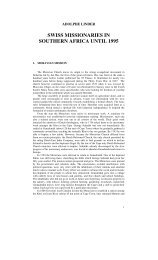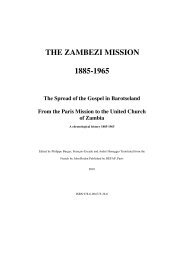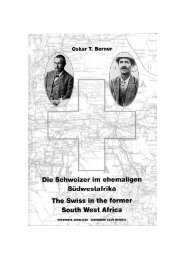THE SWISS IN SOUTHERN AFRICA 1652-1970 - swissroots-za.ch
THE SWISS IN SOUTHERN AFRICA 1652-1970 - swissroots-za.ch
THE SWISS IN SOUTHERN AFRICA 1652-1970 - swissroots-za.ch
You also want an ePaper? Increase the reach of your titles
YUMPU automatically turns print PDFs into web optimized ePapers that Google loves.
and mer<strong>ch</strong>ant, and served as Mayor. He married the daughter of German<br />
missionary Kolbe by whom he had six <strong>ch</strong>ildren.<br />
The Werdmullers were always proud of their Swiss origin and through all the<br />
generations preserved their Swiss citizenship. The family owns valuable property in<br />
Switzerland, held in a family trust, from whi<strong>ch</strong> ea<strong>ch</strong> member receives an annual<br />
dividend. / 1 Weisz & Werdmüller, 1949; 2 KAB, J 41; 3 Men of the Times p. 419.<br />
De Salis, Baron Rudolph Anthony born Arnhem NL 28.12.1761, died The Hague NL<br />
24.12.1851. Possibly a descendent of an officer in a Swiss mercenary regiment in Dut<strong>ch</strong><br />
service. Compare with Paravicini and Werdmuller. Arrived with General Janssens in<br />
1802 and was installed as First Member of the Council, a post he held until the British<br />
returned to the Cape in 1806. During General Janssens’ absence on a lengthy journey to<br />
the interior in June 1803, De Salis was Acting Governor. He departed 10.11.1806 for<br />
Holland on board the cartel William. While at the Cape, on 4.6.1804, he married Sophie<br />
Adrienne van Rheede Oustshoorn of Cape Town. / SA Dictionary of Biography.<br />
Paravacini di Capelli, Willem Bartolomeus Eduard born Zutphen NL 22.2.1778,<br />
died Rotterdam 21.4.1848. His great-grandfather Johan Caspar Paravacini born Chur<br />
GR 1660 and died The Hague 1761, had been Captain of the Grisons, a Swiss<br />
mercenary regiment in Dut<strong>ch</strong> service, his grandfather Bartholomeus Eduard Paravicini<br />
di Capelli 1724-1810 was General and Weapon-developer of the Netherlands, and his<br />
father Caspar Paravicini di Capelli 1752-1825 Major-General and member of the<br />
Central Comite voor Artillerie en Genie in the Dut<strong>ch</strong> army.<br />
Paravicini was Aide-de-Camp to General Janssens at the Cape 1802-1805. His journal<br />
was published in Vol. 46 of the Van Riebeek Society.<br />
/ S.A. Dictionary of Biography.<br />
Tevener, Jan, born Neu<strong>ch</strong>atel, age 35, by profession <strong>ch</strong>ocolate maker, arrived at the<br />
beginning of 1803 as member of the 5 th Battalion Artillery, Company No.3. Deserted<br />
16.3.1804. / Kaaps<strong>ch</strong>e Courant, Vol. II, No. 18 (5 May 1804)<br />
Grand, Georges-Francois born Eclubens / Lausanne VD 1749, was educated by<br />
private tutors and in 1765 sent as an apprentice to a paternal friend in London. Finding<br />
the treatment too harsh, he fled to a maternal aunt. His mother’s family was resident in<br />
England, having fled there at the Edict of Nantes. Her husband who was a director of<br />
the British East India Company, helped him to qualify for service in India and in 1766<br />
he sailed for Bengal, where he was employed as a clerk.<br />
1, 2 & 3<br />
In July 1777 he married Catharine Nol Wehrle, the 14 year old daughter of a Fren<strong>ch</strong><br />
official in Chandenagore. She must have been a very lively person. Grand could not<br />
adjust to her and in December 1778 he accused her of adultery and they parted. Divorce<br />
was not possible as they had married in the Roman Catholic <strong>ch</strong>ur<strong>ch</strong>.<br />
Grand continued to serve the British East India Copany, holding, as he later wrote,<br />
important positions in Hindustan, until for some unexplained reason he was dismissed<br />
in 1799 and embarked for England. The Cape was a regular port of call for the British<br />
Indiamen and during various brief sojourns Grand had come to love it. In a letter dated<br />
April 1776 he described the Cape as a “paradise of climate, in the height of the fruit<br />
season”. This time he stayed seven months before proceeding and after his arrival in<br />
Europe he lost no time in obtaining, with the help of his discarded wife, the appointment<br />
of a prestigious position in the Cape Government.<br />
Catharine had returned to Europe in 1781. Su<strong>ch</strong> evidence as could be collected<br />
definitely suggests that she was inncocent of adultery against Grand and in fact loved<br />
him deeply, but he refused to accept her pleadings and sent her away with a small<br />
allowance. Her reputation ruined and unable to remarry, she decided to enjoy life to the<br />
full. While stopping over at the Cape en route to France, she caused a stir with her<br />
beauty and loose morals. Here she met Count Nicola de Barras, a soldier in the Fren<strong>ch</strong><br />
regiment Pondi<strong>ch</strong>ery stationed at the Cape who afterwards became a leading figure in<br />
the Fren<strong>ch</strong> Revolution.<br />
115



